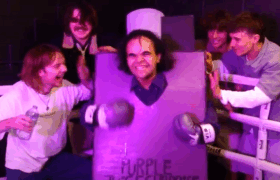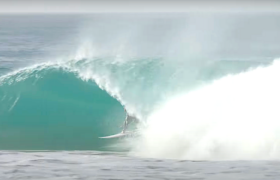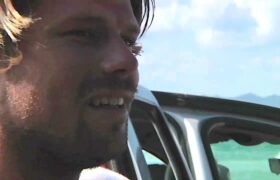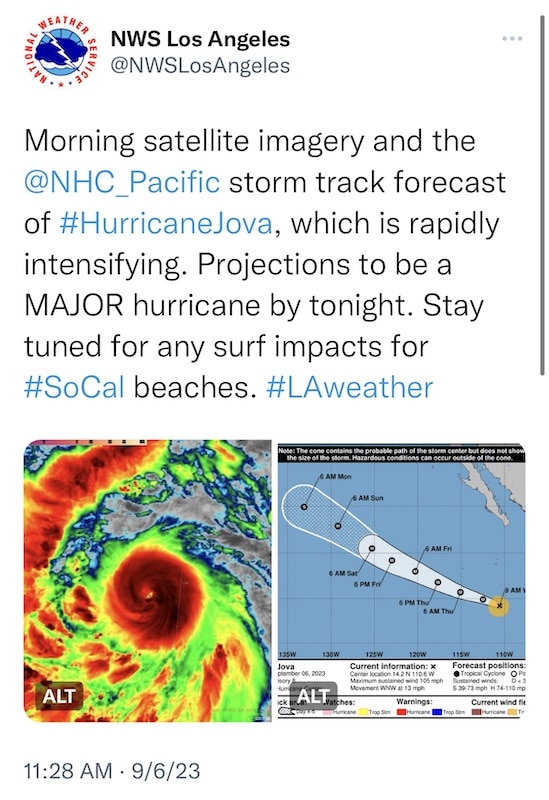Come and melt over Dedi Gun, saviour of the wretched at Lakey Peak!
Every morning not long after sunrise his captain’s hat bobs past the walls of the beachfront hamlet, followed by a throng of bare-chested local groms, surfboards in hand.
The Pied Piper of Lakey Peak is checking the surf.
After years abroad chasing a pro surfing career with Rip Curl, Dedi Gun, who is thirty-six, has returned to Sumbawa’s south coast with a clear goal – to help shape the future of his home.
Despite its potential, Sumbawa, one of the West Nusa Tenggara provinces, has been overlooked by Indonesia’s renewed tourism push. While Flores and the Komodo national park to the west are on top of the priority list of tourism destinations, the economical drawcard on the southern side of Sumbawa is a gold and copper mine just a five-minute scooter ride from the world-class breaks.
But few locals have the necessary education to get a job there. There are stories of angry mobs stopping the trucks to the mine, demanding jobs. A tough life making a living off fishing and farming corn is the outlook for the future generation at Hu’u, the district surrounding the surf spot.
Behind the main road, the stubbly remains of barren corn fields slope towards shrub-covered hills, lacking the tropical abundance of Indonesia’s more picturesque surf destinations.
A rocky mud trail leading to the beach is guarded by a crumbling, eerie looking gyprock surfer, one of the few reminders of Lakey’s time being featured on the world qualifying circuit in the late nineties. Two judging towers of questionable integrity still stand tall on the reef in front of the Peak, Lakey’s premier wave. Built with little consideration, a clumsy concrete toilet lump blocks the view of beachfront accommodation.
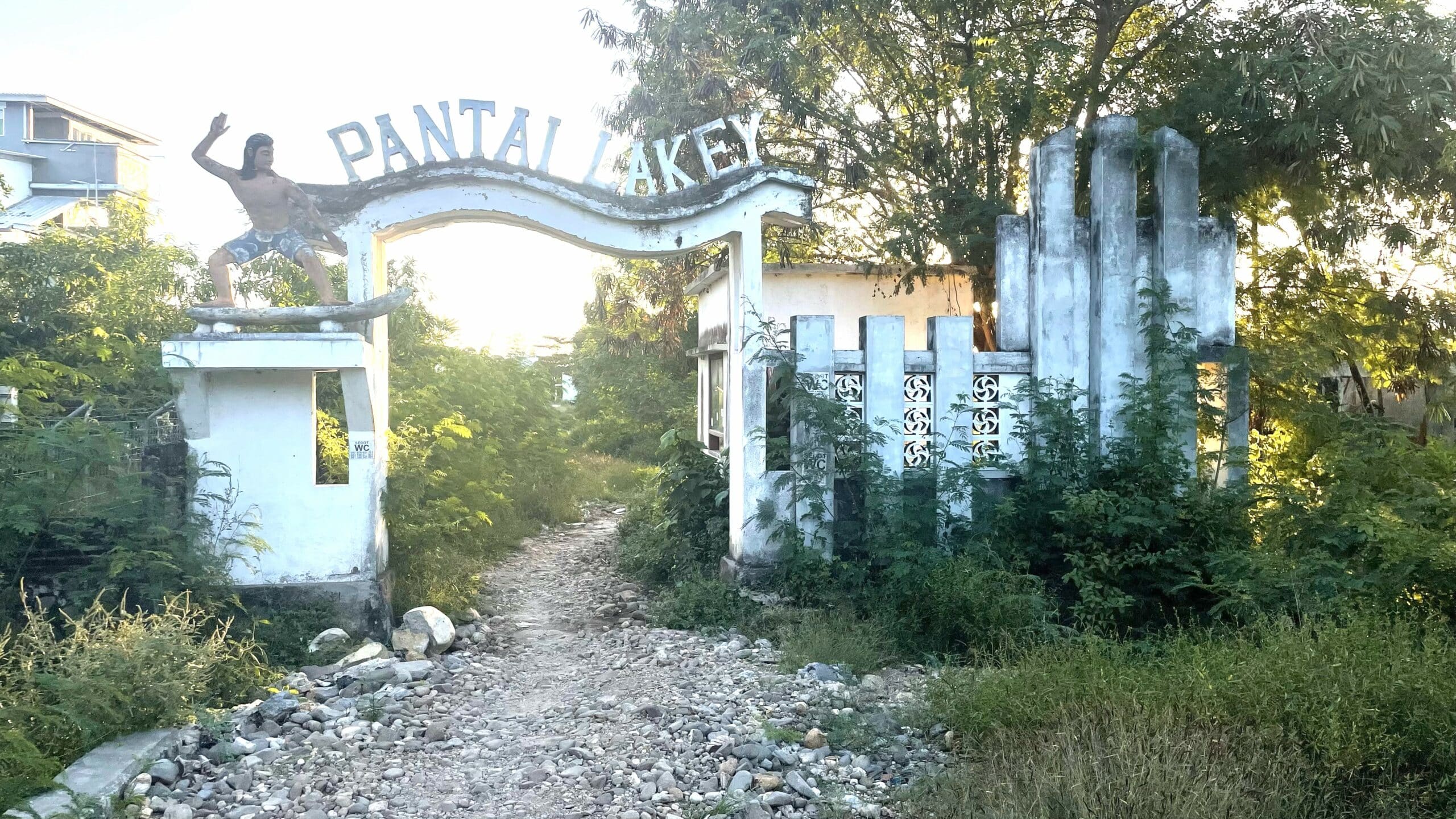
On the way to Nunggas, a long lefthander good for big swells, the mosaic beach path has in large parts been gnawed away by the tide.
Easy access from Bali has plenty of surfers flocking to Lakey, but few locals have a share of the tourism pie.
Dedi, who now runs surf coaching in Lakey Peak, shakes his head after getting off the phone to one of the groms who’s running late.
“You may not get another opportunity,” he mumbles, a group of surf students eagerly waiting to paddle out.
Surfing a metaphor for life
“When there is a chance coming to you, you got to take it,” Dedi says to me as we bob in the water at Lakey Pipe.
Besides his notorious captain’s hat, Dedi wears many others. For a while he’s been leading the local Boardriders, The Lakey Peak Boys, he manages surf lodgings, sells honey and organises BBQs besides just welcoming his second child.
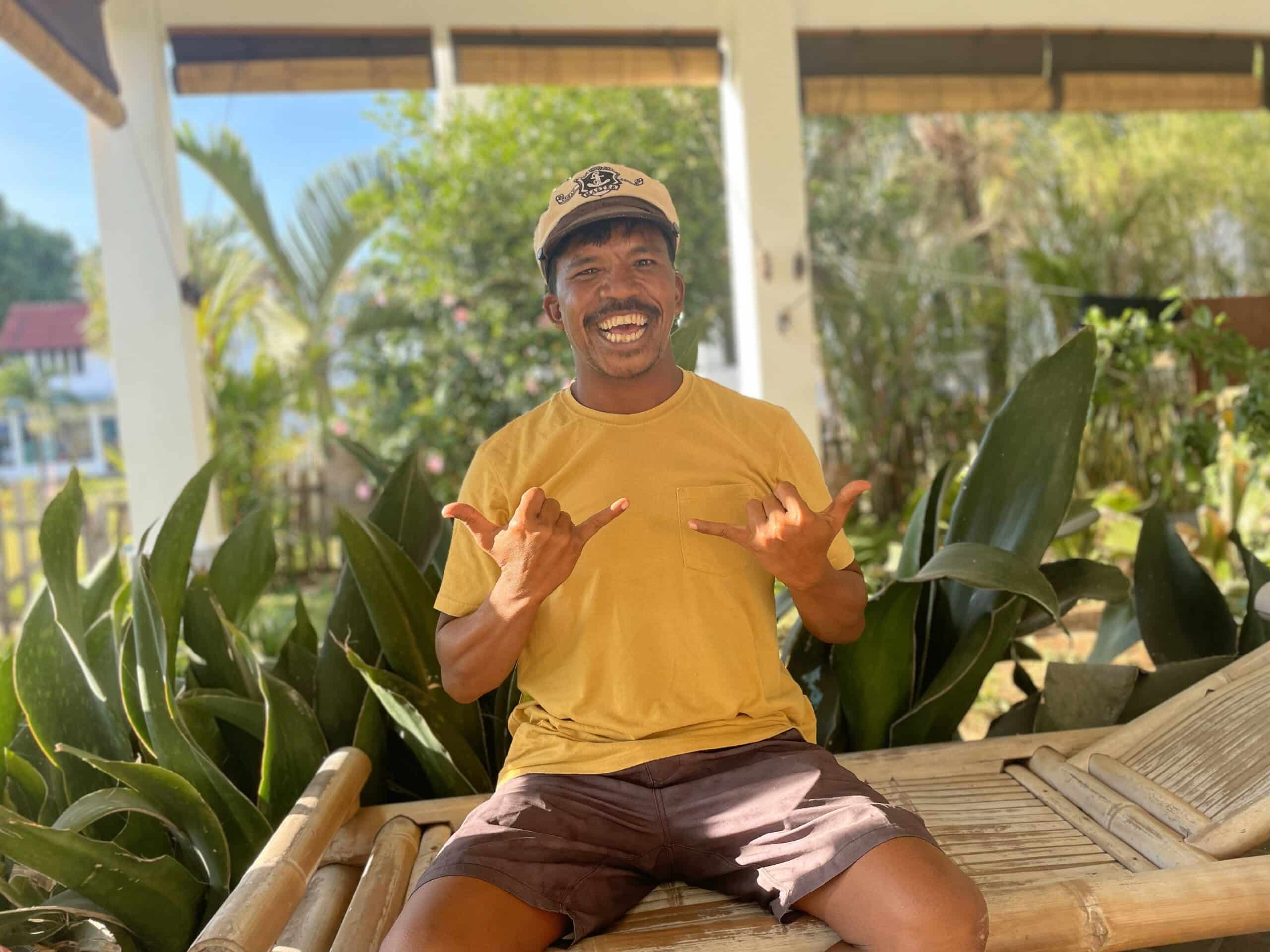
But opportunity didn’t come easy. At eight years old, having been sent to live with relatives to work on their farm, he left for the lure of surfing at the seaside enclave. He lived on the beach, sleeping on the tables of the beachside restaurants, doing odd jobs to get fed.
“My first board was piece of wood,” he says, flashing his noted smile.
“I was living happy …some of my friends had to find empty bottles, Coca Cola or beer, to sell, to survive. [But] we weren’t that hungry, because we have a lot of trees, we just climb.”
When he was 12 he moved to Bali under the wing of surf photographer Dustin Humphrey and at 17 he started to live on his own. He said surfing gave him the opportunity to travel the world. But his surfing career didn’t go as planned. He says he lacked the hunger to be a professional competitor, spending many years in Bali, living “like a rock star”.
“Surfing, partying … I didn’t really have a future thinking. More having fun every day. But I’m glad I learned early,” he says.
After the pandemic he returned to Lakey, keen to encourage the new generation to strive for more.
“In my generation, we never got taught nothing – zero. We had to make it our own,” he says.
“I [made myself] a promise … when I got out of Lakey Peak the first time. I had a burger on a nice plate on a nice table, I want all my friends to feel what I feel, sleeping in a nice bed.”
Surfing also gave him the opportunity to learn and have a vision of his future, something missing in Lakey.
But for him it’s more than that.
“[It] is more than just surf, it’s more than just a sport. It all comes together. Mindset, mentality, psychology. It’s meditation. Appreciation. And it teaches you to be patient. You always want to get a good wave, and there is a chance, and when there is a chance coming for you, you got to take it. There is no next. But you have to choose the right one. If that’s the chance for you, you got to follow.
He’s roped the local teens into his coaching, teaching them how to muscle in on the tourism business. He wants them to develop discipline, accountability and teach them how to make money.
Dedi says Lakey’s big problem is a lack of education.
“Not a lot of kids are going to school. From here to Nangadoro [a village 5km up from Lakey], the schools are not really active. When they go to school, they say ‘oh, the teacher is not there’”.
They are simply not getting paid enough to support their families on a teacher’s wage, he says.
The bleak outlook for the children of Lakey, many of which swap school uniforms for gruelling farm work to help their families, has drawn the attention of those visiting the wave paradise.
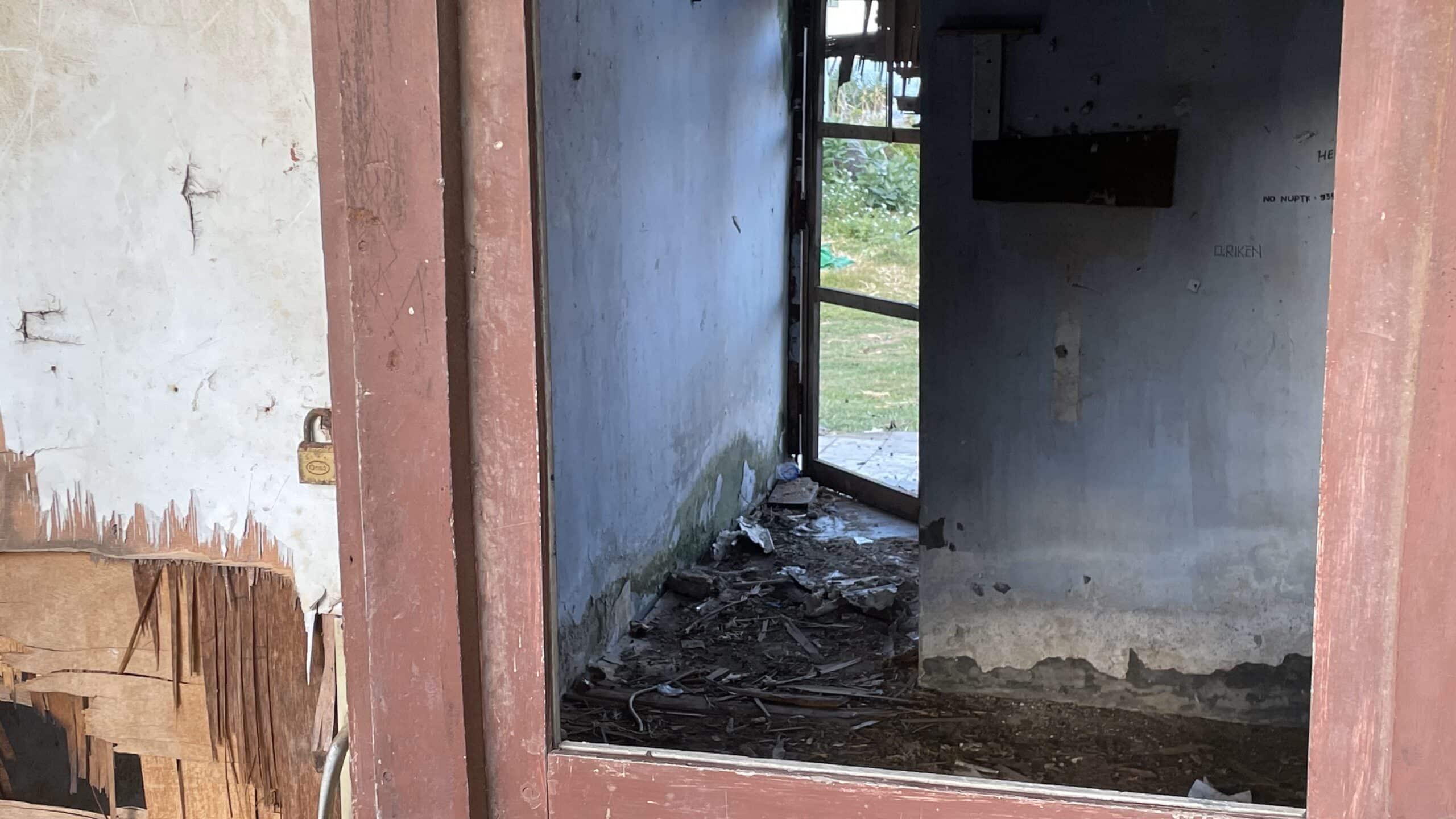
For almost fifteen years now the Harapan Project, set up by Spanish lawyer Carlos Ferrandiz, helps with educating local children, donating sports and health equipment. A short stroll up the hill from the main road at the entrance of the village, past cow paddies and corn stubbles, a state-of-the art skate park unravels, crowd-founded by a 13-year young Japanese girl after being in Lakey during the pandemic.
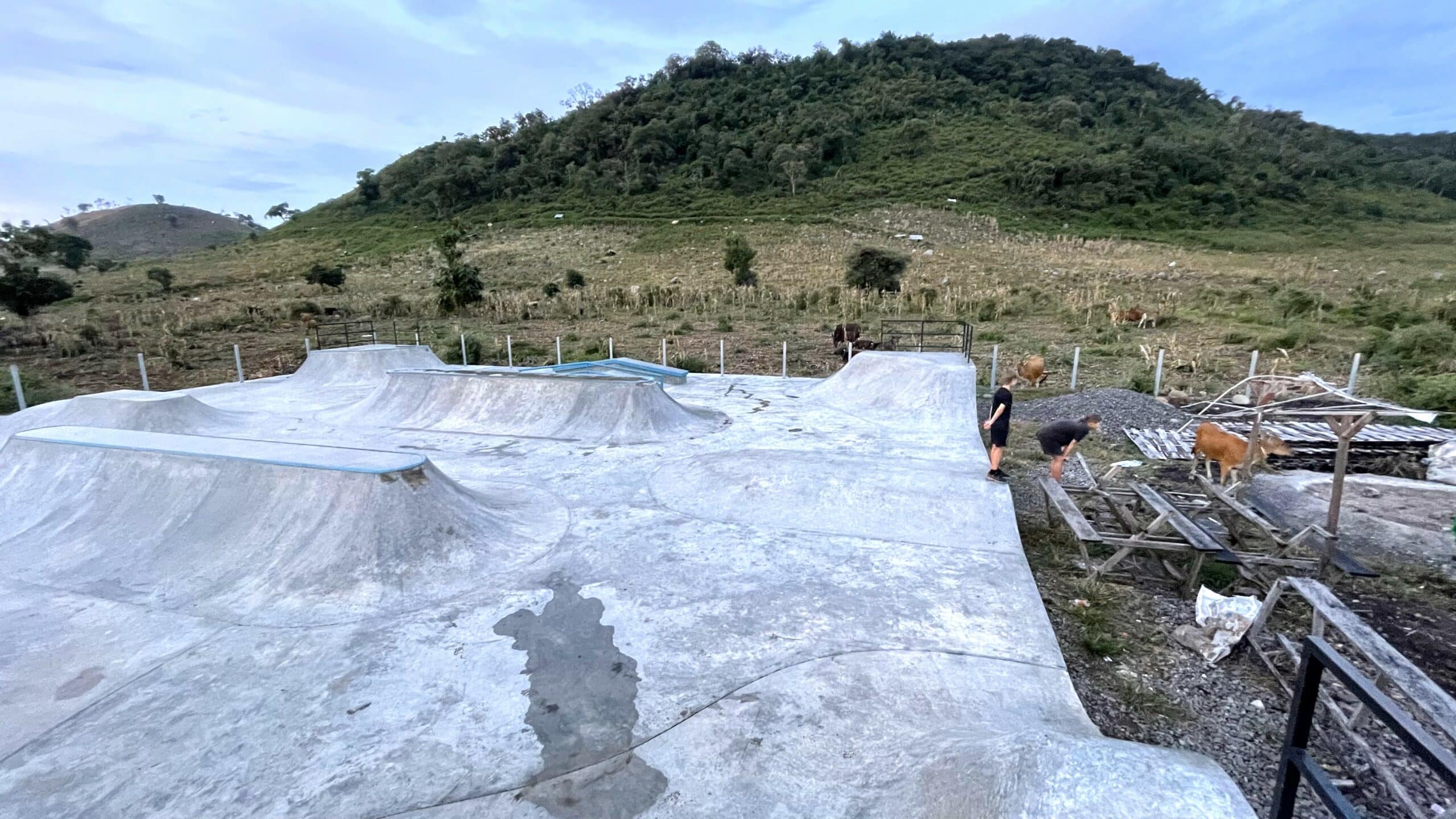
The captain’s surf team
“When I came back here since [since the pandemic] I was leading the Boardriders, trying to put [the kids] on the right path, educate them about tolerance, communication, environment, teamwork … [being] a community,” says Dedi. “I got all these ideas from travelling. When I was young, I got zero motivation. So, we tried to set up this because there is no real education in school.”
With only the national TV station on twenty-four hour hum in households and international channels reserved for those with money, he says the local kids lack input and ideas.
“It’s sort of brainwash. Put us down. There is no support to educate them to grow their own smart. Keep the small people low.”
As we walk back up the beach after our lesson his face shrouds, kicking at one of the many plastic rubbish nests made of single-sip plastic water cups, snack bags and wrappers lining the edge of the shore.
“I need to wake these people up, I don’t get how they don’t see this … It is really sad.”
It’s something that robs Dedi of his sleep, turning ideas in his head on how to instil awareness of the environment.
Him and his grom squad used to clean up the beach every week, but he says the kids are getting tired of seeing the rubbish return just days later. Despite setting up trash cans, the rubbish would still end up strewn around the picnic spots and fireplaces they leave behind.
“They are so lazy …they bring the water cup … they could bring the gallon.”
He says he has lobbied local authorities to issue hefty fines for littering but has yet to get any support for his plight.
“Many international surfers who come here they will think we don’t care. But we deeply care. It is our home.”
The thing with tourism dollars
Dedi wants to bring attention to Lakey and thinks having international surf contests back in Lakey could inspire the local kids. But government attention on its tourism is a double-edged sword.
“The government is not looking at Sumbawa as tourism priority, it’s more of a mining destination,” says Krystyna Krassowska, who runs a sustainable trail tourism business across Indonesia and has been working as team leader for the tourism master plan in Labuan Bajo (Flores). “The minute they get some sort of recognition as a potential tourism object, then it comes down to what is there – and the government’s understanding of this… Take Uluwatu for example, which was natural and amazing, which is now being destroyed by the different perception the government has of what nature-based sports tourists seek. It’s not to be able to drive mega buses up there. They make it ‘more valuable’ by infrastructure development which is not what the surf community wants. This is where the great conflict emerges – so is it a good thing or a bad thing that [Lakey Peak] is not on the priority list?”
She says it’s due to Indonesia’s decentralisation that districts, such as Hu’u, are responsible themselves of how they distribute the profits from their assets – may it be tourism or mining – back to the people.
Investment into clean water, waste management, schools, and training are up to the district leadership.
Despite his hope to give locals something to aspire to, Dedi is firm that he does not want to see his Lakey Peak descend into a new Bali.
“Imagine everyone loves Lakey Peak, all these investors out there … bang, five-star hotels, clubs,” he says.
Krystyna says to keep the integrity of the place it needs sustainable investment from individuals.
“Local communities and villages are then able to recognise their eco-tourism assets, like surfing, which is also in line what the surfing community wants. This would empower local village leaders to align district-led investment with what they actually need.”
As the sun sets, Dedi and the groms kick around a soccer ball at the lawn in front of The Peak.
Dozens of the boys have previously qualified for national surf contests in Bali, so far without any government support to help cover costs.
“I want to put them on the right path,” he says, envisioning a Boardriders club house for the kids, with some beds to sleep and a room for teaching.
“But,” he says, “the kids won’t walk out of the house without fixing their bed first.”
He wants to create a community garden where they would grow fruit and vegetables in exchange for donations, vehemently rejecting the idea of them going around ‘begging’.
“There is a life out there,” he says. “A lot of opportunity, a potential. You got to give it a shot. Don’t say you can’t. Give it a go. Don’t stay in the same place. Climb the rope to the top.”
(Editor’s note: The author Fran Rimrod was your ol pal DR’s sub-editor back when he was writing polemics for Fairfax Newspapers in Australia. She’s on a worldwide hunt for waves with her stud and two kids.)
